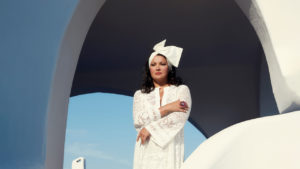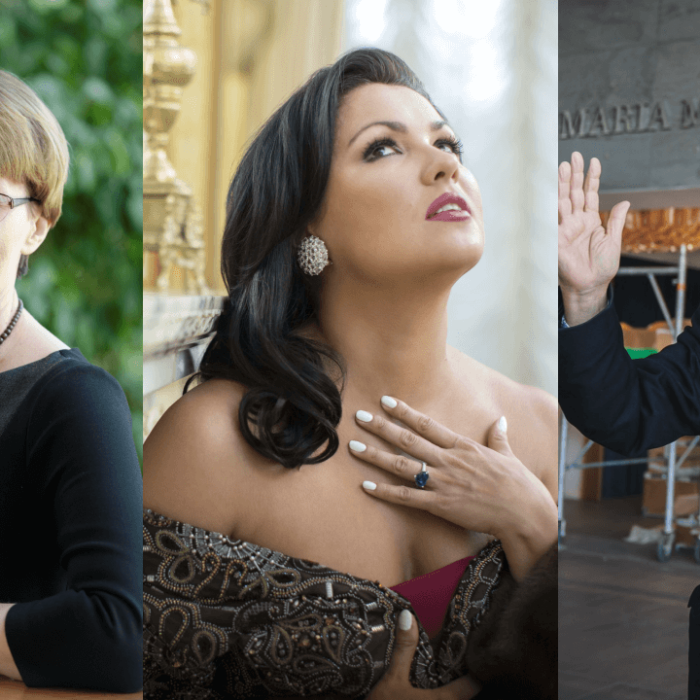
Editorial: Diva In The War
How Anna Netrebko’s Case Proves Opera As The Most Political Artform
By Polina LyapustinaPhoto: Juilian Hargreaves
Since the end of February 2022, in statements made by several artist or theaters, we have kept reading something along the lines of: “Art must be separated from politics.” It is an encouraging and probably fair point, but can it be, especially, when we talk about opera?
Today, when we enjoy a performance worth hundreds of thousands of dollars of an artform that was initially created for the powerholders and elite audience, do you still believe THIS artform is far from politics?
Centuries ago, without the proper understanding of politics, you would never understand the meaning of the piece, and would probably think that “L’incoronazione di Poppea” is a just powerful story of passion with a happy ending; however, Monteverdi wrote it as a blunt satire that was supposed to show the wealthy (and power-hungry) Venetian public how horrible and disgusting Romans were (and what a terrible ending awaits all of them even after the glorious triumph).
When opera had just begun, theaters were the center of social life, so it was no surprise that the sharpest topics snuck on stage shortly. This history of opera is also one laced with censorship. Verdi’s fights with censors over his works is arguably the most renowned example, but you can also see this in how operas were often adapted into different names with different characters when performed in different countries or theaters. So for centuries, what you could see on stage affected the minds of leaders of generations. But, as I wrote a couple of years ago, World War II changed the game, the cities lay in ruins, and in the midst of all this confusion, we missed how opera and theatre lost their social values, replaced with mass media and TV. Since then, opera became a special treat for refined opera lovers (still power-hungry and valuing the status), and the artform turned to focusing on a perfectly-shaped performance. Context and social value faded into the background.
The audience might forget the social component, but the artists and management kept paying the price for the great performances and their influence on the elite audience. You can become a pop star using YouTube, but to become an opera star, you have to sing at La Scala, the ROH, and the Met. And these temples of art dictate their own rules just as much as governments do.
And no matter how artists wished to separate themselves from politics, when the war came, voicing their position for many artists became obligatory to keeping their jobs. On top of that, mere rejection of the war could be not enough for those who were in any way associated with Putin in the past.
But was any top Russian artists free? Following the legacy of Soviet times, only loyal artists were allowed to reach star status in 21st-century Russia. Anyone expressing criticism met serious problems under Putin’s rule and often ended up on trial. Before the war, “supporting” the regime was a usual though not a desirable attribute of fame on Russian stages.
Today, when we all follow the development of the situation with Anna Netrebko and try to guess her real motivation, I found the possible background scenarios more interesting than the truth, which I believe we will never know for sure. But also, the “truth” that would be recognized and accepted officially in the end, will show us the balance of power in the industry.
I suppose, for many artists, to condemn the war (like Anna Netrebko did in her statement on February 26) would be enough. But at that point, everyone was already dismayed by Netrebko’s pictures with Putin during her awarding the National Artist of Russia title and another one taken with separatist leader Oleg Tsaryov holding the “New Russia” flag in Eastern Ukraine in 2014. This time, no one was going to believe Netrebko’s actually very well-written statement so easily. In the next few days, the soprano withdrew from all her upcoming Met Opera engagements and all the events in Europe, including Italy, where the even obvious and reasoned cancelation of Gergiev caused a wave of indignation and protests from both the public and professional circles. The official position towards the famous soprano was absolutely clear.
But if we could stop applying western practices to this case (those that imply that the artist has a clear understanding of what they do offstage, where power can be confronted, and good deeds may have shades of grey), we will have to admit that awarding the National Artist in the presence of the president as well as supporting Putin in 2012 (and less publically in 2018) was a usual (and nearly mandatory for a successful person) practice in Russia, and several artists who are now leading the protest were involved in such activities too.
The case with Donbas (in 2014, Netrebko donated 1 million rubles to Donbas Opera) immediately put soprano on the sanctions list. But while for the western world it meant almost a direct support of terrorism, the fact that workers of Donbas Opera were in really tough conditions, too was not in dispute. In all of Netrebko’s local interviews, it was easy to see that she was frightened by the reaction that her photo with the flag (which she claimed was just suddenly slipped to her) caused, but she never thought that anything could override her majestic goodwill gesture.
All these events from the past often appeared like the rash (and not really elaborate) actions of a Diva who wanted to shine in her homeland, where she had not lived for a long time and already seemed to have forgotten how to live in that reality. Was it simple foolishness or total confidence that Putin’s patronage will save her from everything? In any case, trivial caution and awareness would have saved the disgraced queen’s head.
Meanwhile, during the first days of March, the star soprano lost all her engagements in Europe and the US. And Met manager Peter Gelb stated, “It’s hard to imagine a scenario in which she will return to the Met.”
By the end of the month, Netrebko, who was on vacation in Dubai, was also dropped by her European management from Centre Stage Arts Management and switched to Berin Iglesias Art.
On March 30, the disgraced soprano returned with a new statement where she noticed: “I expressly condemn the war on Ukraine and my thoughts are with the victims of this war and their families. My position is clear. I am not a member of any political party nor am I allied with any leader of Russia.”
At the first, I thought it only underscored her lack of understanding of how the modern world works and that soprano still could not understand that now she would have to pay a way bigger price to return.
The leaders of the industry thought so too, the Met’s Peter Gelb commented: “We’re not prepared to change our position. If Anna demonstrates that she has truly and completely disassociated herself from Putin over the long term, I would be willing to have a conversation.” Evidently, no arrangements anywhere have been resumed after this statement.
But Netrebko’s new manager, in his numerous, confident-to-the-point-of-bragging interviews in Russia stated that soprano is going to return to European stages very soon. The artist herself noted it in her statement too: “After taking my announced break, I will resume performing in late May, initially in Europe.”
What could lay behind this confidence? I found no reason for that until I saw the news on April 1. What a funny coincidence (?), the news came on Fool’s day.
“The State Opera and Ballet Theatre in Novosibirsk in Siberia has canceled Anna Netrebko’s June 2 concert,” it said.
“Yesterday the artist made a statement condemning the actions of our state. Living in Europe and having the opportunity to perform in European venues were more important to her than the fate of her homeland. Today is not the time to compromise one’s principles for the sake of more comfortable living conditions. Now is the time to make a choice,” reads the statement.
Big headlines flooded the Western and Russian press. It was instantly called the beginning of the end of the soprano’s career in Russia. And almost immediately afterward: “Chairman of the State Duma Vyacheslav Volodin accused Russian opera singer Anna Netrebko of betraying her country.”
All those harsh words… “She has a voice, but no conscience,” Volodin wrote in his Telegram channel.
Oh, give me more, I thought. What a circus.
At that moment I had a major question: Is any of it as really bad for soprano as it sounds? Or does it just “truly and completely disassociate” Netrebko from Putin as requested by Gelb?
Novosibirsk State Theatre is a big institution indeed, and yet, tours to Siberia are not in the habit of stars like Anna Netrebko, who was mostly seen on the stage of Bolshoi or Mariinsky. And while the press were screaming about the cancelation, gazeta.ru and a few media from Sankt-Peterburg noted one more interesting fact — the Mariinsky Theater has not questioned Netrebko’s participation in “The Stars of the White Nights” after any of her statements.
Every summer, the Mariinsky Theatre traditionally hosts a major festival, the “Stars of the White Nights,” conducted by Putin supporter (and supported) Valery Gergiev. The festival program includes premieres, grand symphony concerts, chamber music masterpieces, and the best opera and ballet productions in the repertoire of the theatre.
This event is not the one Netrebko would like to lose and also, the one that should have been canceled first of all and with great publicity to emphasize the Russian authorities’ refusal to have any engagement with the singer. But two more months before the festival leave enough space in this game for either to forgive the artist or use this cancelation to confirm (slowly and consistently) Netrebko’s break with the Russian authorities.
An aggressive appeal to deny the singer of her titles in the State Duma seems an even less reliable signal. Today, Russian politics find its true mission in either praising Putin or pointing out and threatening enemies of the state as loudly as possible in the best traditions of the Central Committee of the Communist Party of the Soviet Union.
Today’s wars are not like the wars of the past. They seem to collect all the most terrible features over centuries and upgrade them with modern technology. However, opera art (at least in Russia) seems to be stuck in the Soviet tradition and today, we see how one of the greatest sopranos of our time explores the rules of living in a bipolar world. The artist’s actions don’t look clever and confident, and so far it’s only clear that she’s trying to sit in two chairs at the same time.
And I could try to predict the result, but I don’t think I should. Any prediction I would base on logic, laws, and morality, but the only thing I know today for sure is that twenty-first-century politics doesn’t work this way.
However, one thing I do know for sure is that the 21st-century opera is still stuck in politics up to its neck.
Categories
Editorials

